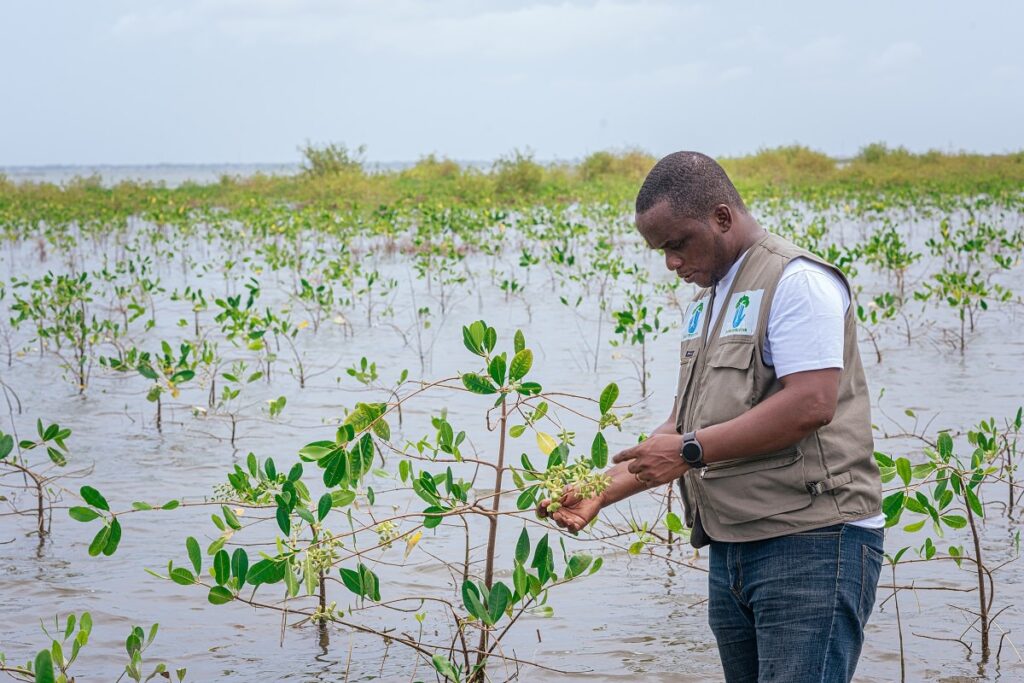
Terraformation, a forest restoration company, has partnered with Grosvenor, a UK property business, to sell the first carbon credits from its Seed to Carbon Forest Accelerator program.
The project, known as Regenerative Development of Anlo Wetlands (ReDAW), will restore 1,536 hectares of mangroves in Ghana’s Keta Lagoon. Funded by Grosvenor, the project is expected to sequester over 1 million tonnes of CO2 by 2064, with an initial credit sale generating 15,000 tonnes at an average price of nearly $50 per tonne. Payments are structured to support the first two years of forest restoration.
Beyond carbon capture, ReDAW will deliver significant benefits for local communities. The project will create full-time jobs, with over half filled by women, and train 350 people in planting and caring for the mangroves. Additionally, the project will promote regenerative aquaculture, agriculture, and beekeeping, leading to increased food security and environmental resilience.
Joella Korczak, Chief Programme Officer, ReDAW, said: “The land in this area is prone to floods in the wet seasons and extended drought periods in the dry season. Restoring mangrove forests offers flood resilience through natural water management. The improved ecological function and enhanced fisheries resulting from more mangroves contribute to increased food production, ensuring better food security for the community. Restoring and preserving mangrove ecosystems will enhance community well-being while creating alternative livelihoods.”
This project marks the first carbon credit sale from Terraformation’s Seed to Carbon Forest Accelerator, a program focused on supporting native reforestation efforts. The program provides funding, training, and expertise to help forestry teams develop high-quality projects that prioritize biodiversity and community benefits.
Yishan Wong, CEO of Terraformation, said: “On average, only 11 new reforestation or afforestation projects enter the market a year, and out of those, only a few are native-species restoration projects. Our Accelerator combines the speed and scale that Silicon Valley is known for with forestry expertise to unlock access to funding and provide training, tech and seeds to start creating a forest before a single tree goes into the ground.
“Companies like Grosvenor, which are investing upfront to build new forests – not just buying credits from trees already sequestering carbon – signal their commitment to making an impact and a significant investment in their climate and nature targets. I hope to see many other companies follow suit.”
Grosvenor prioritizes responsible carbon offsetting, focusing on projects with community benefits and transparency. Their investment allows Terraformation to support critical early-stage funding for native reforestation projects.
Andy Haigh, Director of Climate Positive Solutions, Grosvenor, said: “Absolute emissions reductions remain our priority, but corporations cannot ignore the emissions that are more difficult to reduce. We are committed to thinking long term in sourcing high-quality carbon offsets and want to work with partners with integrity and deliver significant environmental and community co-benefits through the projects we support. We see value in helping to develop and scale projects, because early-stage funding is desperately needed for the sector to grow, plus it allows us to be more selective in finding projects that meet our due diligence criteria. We have been impressed with the integrity Terraformation has taken in developing this project and we look forward to working with them in its delivery.”
The project aligns with Ghana’s national goal of restoring 2 million hectares of deforested land by 2030. Mangroves play a vital role in Ghana’s coastal communities, providing both environmental and economic benefits. Deforestation has threatened these ecosystems, but projects like ReDAW offer a path towards a more sustainable future.
Lawrence Tetteh Oclo, District Manager, Keta Lagoon-Ramsar Site of the Wildlife Division of the Forestry Commission, said: “Our focus on supporting increased investments in reforestation initiatives is to position Ghana as a hub for innovative green projects like ReDAW. These projects offer substantial economic benefits, driving both sustainable development and job creation, and contribute to the fight against climate change. Replanting and restoring degraded mangrove forests help reverse the damage caused by deforestation and contribute to Ghana’s pledge to restore 2 million hectares of deforested and degraded land by 2030.”
Image credit: ReDAW
Swanwick House, 22 Towcester Road, Old Stratford, Milton Keynes, MK19 6AQ, UK
© 2025 Project Management Global. All rights reserved | Privacy Policy